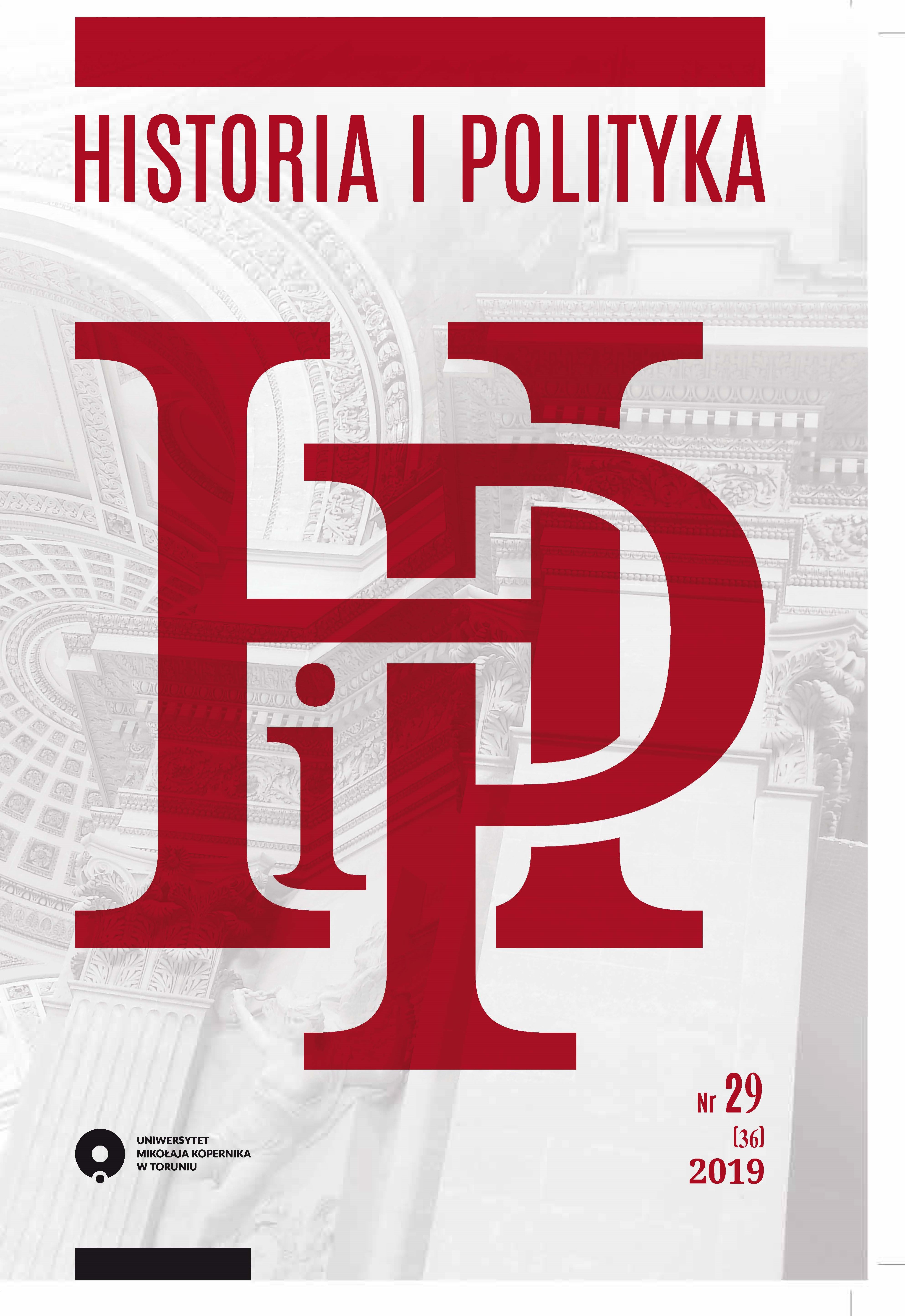Społeczeństwo obywatelskie Mołdawii: ocena funkcjonowania w latach 2016–2018
DOI:
https://doi.org/10.12775/HiP.2019.026Keywords
Mołdawia, społeczeństwo obywatelskie, organizacje pozarządowe, trzeci sektorAbstract
The article presents selected elements of the civil society in Moldova during 2016-2018. In the state, which was established in 1991 as a result of the Soviet Union collapse, the structures of civil society faced numerous difficulties, of both internal and external nature. The most important internal factors are social passiveness and deficit of in-depth communication between authority and non-governmental organizations, while the external factor is a promotion of the idea of civil society as a part of European integration.
References
Ajder, M. (2018). Moldova: How Can We Get Back to the Future? In the Rise of Illiberal Civil Society in the Former Soviet Union? (s. 40–47). London: The Foreign Policy Centre.
Bertelsmann Stiftung’s Transformation Index (BTI) 2018. Country Report Moldova. (2018). Pobrane z: https://www.bti-project.org/en/reports/country-reports/detail/itc/MDA/.
Braha, Ł. (2011). Grażdanskoje Obszczestwo Mołdowy skwoz’ prizmu politiko-kulturnogo analiza. W: Grażdanskoje Obszczestwo Mołdowy: problemy i pierspiektiwy (s. 166–174). Kom-rat: Ins. Pentru Democraţie.
Całus, K. (2016). The Unfinished State. 25 Years of Independent Moldova. Warszawa: Ośrodek Studiów Wschodnich im. M. Karpia.
Declaration “The Attack on Civil Society Organizations Because They Oppose the Amendment of the Electoral System is Inadmissible and Erodes Trust in State Authorities”. (2017a). Pobra-ne z: http://crjm.org/wp-content/uploads/2017/07/2017-05-19-Declaratie-ONG-NEafiliere-politica-EN.pdf.
Declaration “The Attempt to Limit Foreign Funding of NGOs Endangers the Functioning of Democracy in Moldova and Cannot, Under Any Circumstances, Be Accepted”. (2017b). Po-brane z: https://promolex.md/wp-content/uploads/2017/07/2017-07-11-Declaration-MJ-initiative-contrary-to-law.pdf.
Dobrowolska, A. B. (2015). Doswid politycznoho tranzytu Respubliky Mołdowa postra-dianśkoho periodu. W: „Tretia chwyla” demokratyzaciji na Terenach Ewraziji: doswid no-witńioji istoriji ta wykłyky suczasnosti (s. 339–350). Kyiv: Feniks.
Dobrowolska, A. B. (2017). Osobływosti suspilno-politycznoji modernizaciji krajin postra-dianśkoho prostoru. W: A. H. Bulwinśkyj (red.), Protyriczczia na szlachu do politycznoji kon-solidaciji Mołdowy: heopolitycznyjczynn (s. 136–153). Kyiv: Instytut wseswitńioji istoriji NAN Ukrainy.
Dwowładdia w Mołdowi: jak postawyły na misce prorosijśkoho Dodona. (2017). Pobrane z: https://politeka.net/ua/reading/500486-dvoevlastie-v-moldove-kak-postavili-na-mesto-prorossijskogo-dodona/.
Emerson, M., Hriptievschi, N., Kalitenko, O., Kovziridze, T., Prohnitchi, E. (2017). Anti-Corruption Policies in Georgia, Moldova and Ukraine. Pobrane z: http://www.3dcftas.eu/.
Foxall, A. (2017). A “Captured State”: Moldova Between Russia and the West. London: The Henry Jackson Society.
Gherasimov, С. (2017). Moldova: The Captured State on Europe’s Edge. Pobrane z: https://www.chathamhouse.org/expert/comment/moldova-captured-state-europe-s-edge.
Gherasimov, С. (2018). The Rule of Law Is Under Attack in Moldova. Pobrane z: https://www.chathamhouse.org/expert/comment/ rule-law-under-attack-moldova.
IMAS, Socio-Political Barometer. (2017). Pobrane z: http://imas.md/pic/archives/6/Socio-Politic%20Barometer%20December%202017_EN%20.pdf.
În cadrul vizitei de lucru la Budapesta, Igor Dodon a avut o întrevedere cu Președintele Ungariei, Janos Ader. (2017). Pobrane z: http://presedinte.md/rom/comunicate-de-presa/in-cadrul-vizitei-de-lucru-la-budapesta-igor-dodon-a-avut-o-intrevedere-cu-presedintele-ungariei-janos-ader.
International Republican Institute. (2017). Survey of Public Opinion of the Rezidents of the Republic of Moldova. Pobrane z: http://www.iri.org/sites/default/files/iri_moldova_poll_march_ 2017.pdf.
Jagland, T. (2015). Bring Moldova Back From the Brink. New York Times, 10 Aug.
Knight, R. (2018). Confronting State Capture in Moldova. Pobrane z: http://ams.hi.is/wp-content/uploads/2018/06/Confronting-State-Capture-in-Moldova-2.pdf.
LEGE privind aprobarea Strategiei de dezvoltare a societăţii civile pentru perioada 2018–2020 şi a Planului de acţiuni pentru implementarea Strategiei de dezvoltare a societății civile pentru perioada 2018–2020. Pobrane z: http://www.parlament.md/LinkClick.aspx?fileticket=Jzx2WGncgyk%3D&tabid=90&language=ro-RO.
Lutsevych, О. (2013). How to Finish a Revolution: Civil Society and Democracy in Georgia, Moldova and Ukraine. Pobrane z: https://www.chathamhouse.org/sites/default/files/public/Research/Russia%20and%20Eurasia/0113bp_lutsevych.pdf.
Macrinici, S. (2018). Shrinking Space for Civil Society in Moldova. Pobrane z: https://www.soros.md/files/publications/documents/Civil%20Society%20Macrinici.pdf.
Macrinici, S., Chirtoacӑ, I. (2018). Report “One Year of Implementation of the 2% Mechanism in Moldova”. Chisinau: CONTACT Center.
MFW. (2018). Ukraina stała najbidniszoju krainoju Ewropy. Pobrane z: https://www.epravda.com.ua/news/2018/10/12/641571/.
Neicovcen, S., Vidaicu, D., Cioaric, V. (2016). Fundraising by Moldovan Civil Society Organ-izations from Domestic Sources: Opportunities and Perspectives. Chisinau: CONTACT Center.
Plahotniuc, despre protestul de duminică din centrul capitalei. Pobrane z: https://www.youtube.com/watch?v=saG-oPStuaU.
Public Policies Institute. (2016). Barometer of Public Opinion. Pobrane z: http://www.ipp.md/public/ files/Barometru/BOP_10.2016.pdf.
Punctul pe Azi TV Show. (2017). Pobrane z: https://www.youtube.com/watch?list=PLFFshvOJiVM_8Zh5orfwO0UFXalKxnut&v=WTotAd8zPvQ.
Radiography of Attacks Against Nongovernmental Organizations from the Republic of Moldo-va, September 2016 – December 2017. (2018). Pobrane z: https://crjm.org/wp-content/uploads/2018/03/2016-2017-radiography-NGO-attacks-EN.pdf.
Reprezentanţi CNP în grupurile consultative create de structurile de stat. (2010). Pobrane z: http://www.cnp.md/images/stories/doc/Reprezentanti_CNP_in_structuri_consultative_de_stat.pdf.
Sliusarenco, D., Foltea, I. (2018). The Rise of Illiberal Civil Society in Moldova. In The Rise of Illiberal Civil Society in the Former Soviet Union? (s. 48–54). London: The Foreign Policy Centre.
Solak, J. (2014). Mołdawia: republika na trzy pęknięta. Historyczno-społeczny, militarny i geo-polityczny wymiar „zamrożonego konfliktu” o Naddniestrze (s. 97–98). Toruń: Wydawnictwo Adam Marszałek.
Tudoroiu, T. (2015). Democracy and State Capture in Moldova. Democratization, 22(4), 655–678.
United Nations High Commissioner for Human Rights. (2017). Opening statement at Human Rights Council 36th session. Pobrane z: http://www.ohchr.org/en/NewsEvents/Pages/DisplayNews.aspx?NewsID=22041&LangID=E.
United States Agency for International Development. (2014). The 2013 CSO Sustainability Index for Central and Eastern Europe and Eurasia, Washington 2014, 142–150.
United States Agency for International Development. (2017). The 2016 CSO Sustainability Index for Central and Eastern Europe and Eurasia, Washington 2017, 160–166.
Vandor, P., Traxler, N., Millner, R., Meyer, M. (2017). (red.). Civil Society in Central and Eastern Europe: Challenges and Opportunities. Vienna: ERSTE Foundation.
Young Moldova: Problems, Values and Aspirations. Research Into the Opinions of Young Peo-ple in the Republic of Moldova 2016‒2017. (2017). Pobrane z: https://www.oecd.org/dev/inclusivesocietiesanddevelopment/Report_Young_Moldova_Problems_Values_and_Aspirations.pdf.
Published
How to Cite
Issue
Section
License
Nicolaus Copernicus University fully respects the right to privacy and protection of personal data of all authors. The authors’ personal data is not used for commercial and/or marketing purposes.Stats
Number of views and downloads: 0
Number of citations: 0



